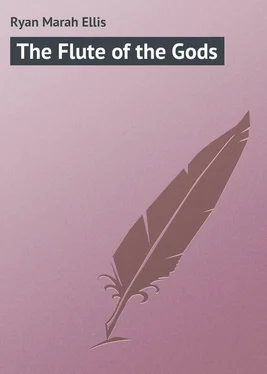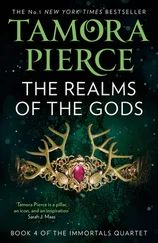Marah Ryan - The Flute of the Gods
Здесь есть возможность читать онлайн «Marah Ryan - The Flute of the Gods» — ознакомительный отрывок электронной книги совершенно бесплатно, а после прочтения отрывка купить полную версию. В некоторых случаях можно слушать аудио, скачать через торрент в формате fb2 и присутствует краткое содержание. Жанр: foreign_prose, на английском языке. Описание произведения, (предисловие) а так же отзывы посетителей доступны на портале библиотеки ЛибКат.
- Название:The Flute of the Gods
- Автор:
- Жанр:
- Год:неизвестен
- ISBN:нет данных
- Рейтинг книги:3 / 5. Голосов: 1
-
Избранное:Добавить в избранное
- Отзывы:
-
Ваша оценка:
- 60
- 1
- 2
- 3
- 4
- 5
The Flute of the Gods: краткое содержание, описание и аннотация
Предлагаем к чтению аннотацию, описание, краткое содержание или предисловие (зависит от того, что написал сам автор книги «The Flute of the Gods»). Если вы не нашли необходимую информацию о книге — напишите в комментариях, мы постараемся отыскать её.
The Flute of the Gods — читать онлайн ознакомительный отрывок
Ниже представлен текст книги, разбитый по страницам. Система сохранения места последней прочитанной страницы, позволяет с удобством читать онлайн бесплатно книгу «The Flute of the Gods», без необходимости каждый раз заново искать на чём Вы остановились. Поставьте закладку, и сможете в любой момент перейти на страницу, на которой закончили чтение.
Интервал:
Закладка:
Ryan Marah Ellis
The Flute of the Gods
PREFACE
In romances of the aborigines of the so-called New World there is usually presented savage man or woman modified as may be by the influence of European mythologies in various authorized forms. But, certain people of this New World possessed at least a semi-civilization centuries before the coming of white conquerors.
When man ceases to be nomadic, builds houses of stone and mortar, terrace upon terrace,–walled and fortressed against the enemy,–when he has fields of growing grain, textile fabrics, decorated pottery, a government that is a republic, a priesthood trained in complex ritual, a well stocked pantheon, a certain understanding of astronomy and psychic phenomena, he may withal be called barbarian, even as was Abraham on Moriah barbaric when the altar of his god called for sacrifice of his only son. But a people of such culture could not with truth be called savage.
The tale told here has to do with these same historic barbarians. That there is more of depth to the background of American Indian life than is usually suggested by historians has been made clear of two tribes by Dr. Le Plongeon in his Sacred Mysteries of the Mayas and Quiches 11500 Years Ago . Similar mysteries and secret orders exist to-day in the tribes of the Mexicos and Arizona. In certain instances the names and meanings of offices identical with those of Yucatan survive, to prove an ancient intercourse between the Mayan tribes and those who now dwell in the valley of the Rio Grande. The Abbe Clavigero left account of a thousand years of the history of one tribe as transcribed by him from their own hieroglyphic records. Lord Kingsborough may have been far astray with his theory that the people of America were the Lost Tribes of Israel, but the researches embodied in his remarkable Antiquities of Mexico , demonstrated the fact that they were not a people of yesterday.
As to historic notes used in this tale of the more northern Sun worshipers: Cabeza de Vaca, the first European to cross the land from the Mississippi to Mexico (1528-1536), left record in Spanish archives of Don Teo the Greek. Casteñada, historian for the Coronado expedition (1540-1542), left reluctant testimony of the worse than weird night in one Indian town of the Rio Grande, when impress was left on the native mind that the strong god of the white conquerors demanded much of human sacrifice. In that journal is record also of the devoted Fray Luis, of whose end only the Indians know. In Soldiers of the Cross by Archbishop Salpointe, there is an account of a god-offering made in 1680 (after almost a century of European influences), warranting the chapter describing a similar sacrifice on the same shrine when the pagan mind was yet supreme and the call of the primitive gods a vital thing.
It is yet so vital that neither imported government nor imported creeds have quite stamped it out. Only the death of the elders and the breaking up of the clans can eradicate it. When that is done, the Latin and the Anglo-Saxon will have swept from the heart of the land, primitive, conservative cults ancient as the Druids.
With thanks to the Indian friends who have helped me, I desire especially to express my obligation to Edward S. Curtis, whose wonderful volumes of The North American Indian have been an inspiration, and whose Indian pictures for this book of mine possess a solid value in art and ethnology far beyond the mere illustration of text.
M. E. R.CHAPTER I
THE WOMAN FROM THE SOUTH
Aliksai! In Tusayan the people were living! It was the year after the year when the great star with the belt of fire reached across the sky. (1528.)
The desert land of the Hopi people stretched yellow and brown and dead from mesa to mesa. The sage was the color of the dust, and the brazen sky was as a shield made hard and dry by the will of the angry gods. The Spirit People of the elements could not find their way past that shield, and could not bear blessings to Earth children.
The rain did not walk on the earth in those days, and the corn stood still, and old men of the mesa towns knew that the starving time was close. In the kivas fasted the Hopi priests, the youth planted prayer plumes by the shrines of the dying wells, and the woman danced dances at sunrise, and all sang the prayers to the gods:–and each day the store of corn was lower, and the seed in the ground could not grow.
In the one town of Wálpi there were those who regretted the seed wasted in the planting,–it were better to have given it to the children, and even yet they might find some of it if the sand was searched carefully.
“Peace!” said old Ho-tiwa, the Ancient of the village, and the chief of Things of the Spirit. “It is not yet so bad as when I was a boy. In that starving time, the robes of rabbit skins were eaten when the corn was gone. Yet you see we did live and have grown old! The good seed is in the ground, and when the rain comes–”
“When it comes!” sighed one skeptic–“We wait one year now,–how many more until we die?”
“If it is that you die–the rain or the no rain makes no change–you die!” reminded the old man. “The reader of the stars and of the moon says a change is to come. Tell the herald to call it from the housetops. This night the moon is at the big circle–it may bring with it the smile of the glad god again. Tell the people!”
And as the herald proclaimed at the sunset the hopeful words of the priests who prayed in the kivas, old Ho-tiwa walked away from the spirit of discontent, and down the trail to the ruins of Sik-yat-ki. All the wells but that one of the ancient city were useless, green, stagnant water now. And each day it was watched lest it also go back into the sands, and at the shrine beside it many prayers were planted.
So that was the place where he went for prayer when his heart was heavy with the woe of his people. And that was how he found that which was waiting there to be found.
It was a girl, and she looked dead as she lay by the stones of the old well. As he bent over to see if she lived, the round moon came like a second sun into the soft glow of the twilight, and as it touched the face of the girl, the old man felt the wind of the south pass over them. Always to the day he died did he tell of how that south wind came as if from swift wings!
He called to some men who were going home from rabbit hunting in the dusk, and they came and looked at the girl and at each other, and drew away.
“We have our own women who may die soon,” they said: “Why take in a stranger? Whence comes she?”
No one had seen her come, but her trail was from the south. She wore the dress of a pueblo girl, but she was not of their people. Her hair was not cut, yet on her forehead she carried the mark of a soon-to-be maternity–the sacred sign of the piñon gum seen by Ho-tiwa when he went as a boy for the seed corn to the distant Te-hua people by the river of the east.
“I come here with prayer thoughts to the water,” said the old man noting their reluctance,–“and I find a work put by my feet. The reader of the skies tells that a change is to come with the moon. It is as the moon comes that I find her. The gods may not be glad with us if our hearts are not good at this time.”
“But the corn–”
“The corn I would eat can go to this girl for four days. I am old, but for so long I will fast,–and maybe then the gods will send the change.”
So the girl was carried to his house, and the women shrank away, and were afraid–for the clouds followed the wind swiftly from the south, and the face of the moon was covered, and at the turn of the night was heard the voice of a man child–new born of the strange girl found by the well in the moonlight. Ho-tiwa in the outer room of the dwelling heard the voice–and more than the child voice, for on the breath of the wind across the desert the good rain came walking in beauty to the fields, and the glad laughter of the people went up from the mesa, and there was much patter of bare feet on the wet stone floor of the heights–and glad calls of joy that the desert was to live again!
Читать дальшеИнтервал:
Закладка:
Похожие книги на «The Flute of the Gods»
Представляем Вашему вниманию похожие книги на «The Flute of the Gods» списком для выбора. Мы отобрали схожую по названию и смыслу литературу в надежде предоставить читателям больше вариантов отыскать новые, интересные, ещё непрочитанные произведения.
Обсуждение, отзывы о книге «The Flute of the Gods» и просто собственные мнения читателей. Оставьте ваши комментарии, напишите, что Вы думаете о произведении, его смысле или главных героях. Укажите что конкретно понравилось, а что нет, и почему Вы так считаете.












